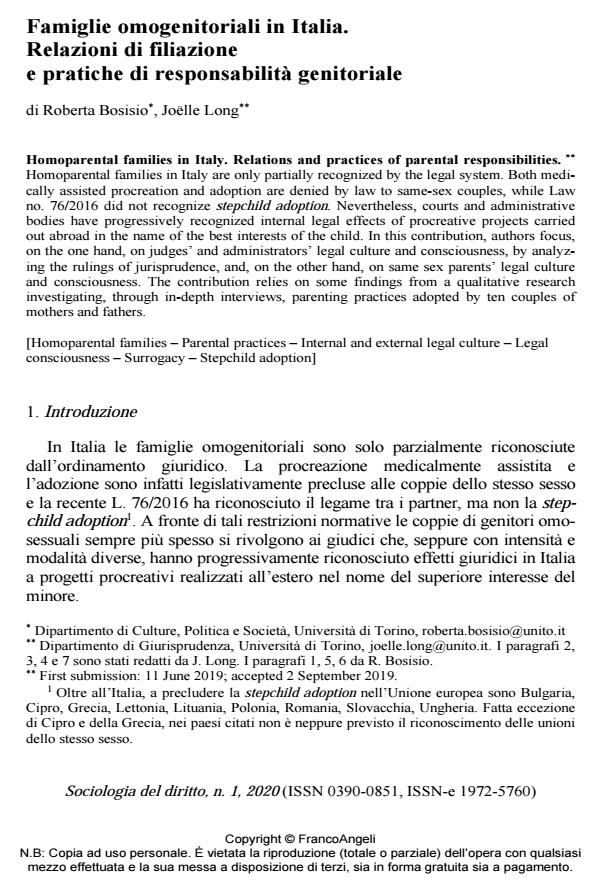Homoparental families in Italy. Relations and practices of parental responsibilities
Journal title SOCIOLOGIA DEL DIRITTO
Author/s Roberta Bosisio, Joëlle Long
Publishing Year 2020 Issue 2020/1
Language Italian Pages 24 P. 153-176 File size 233 KB
DOI 10.3280/SD2020-001009
DOI is like a bar code for intellectual property: to have more infomation
click here
Below, you can see the article first page
If you want to buy this article in PDF format, you can do it, following the instructions to buy download credits

FrancoAngeli is member of Publishers International Linking Association, Inc (PILA), a not-for-profit association which run the CrossRef service enabling links to and from online scholarly content.
Homoparental families in Italy are only partially recognized by the legal system. Both medically assisted procreation and adoption are denied by law to same-sex couples, while Law no. 76/2016 did not recognize stepchild adoption. Nevertheless, courts and administrative bodies have progressively recognized internal legal effects of procreative projects carried out abroad in the name of the best interests of the child. In this contribution, authors focus, on the one hand, on judges’ and administrators’ legal culture and consciousness, by analyzing the rulings of jurisprudence, and, on the other hand, on same sex parents’ legal culture and consciousness. The contribution relies on some findings from a qualitative research investigating, through in-depth interviews, parenting practices adopted by ten couples of mothers and fathers.
Keywords: Homoparental families - Parental practices - Internal and external legal culture - Legal consciousness - Surrogacy - Stepchild adoption
- Contrattualità, giustizia riproduttiva e istanze LGBT nella surrogacy: alcune riflessioni Luca Guizzardi, in SOCIOLOGIA DEL DIRITTO 1/2021 pp.119
DOI: 10.3280/SD2021-001005 - LGBTQ+ Intimacies in Southern Europe Chiara Bertone, pp.147 (ISBN:978-3-031-13507-1)
Roberta Bosisio, Joëlle Long, Famiglie omogenitoriali in Italia. Relazioni di filiazione e pratiche di responsabilità genitoriale in "SOCIOLOGIA DEL DIRITTO " 1/2020, pp 153-176, DOI: 10.3280/SD2020-001009